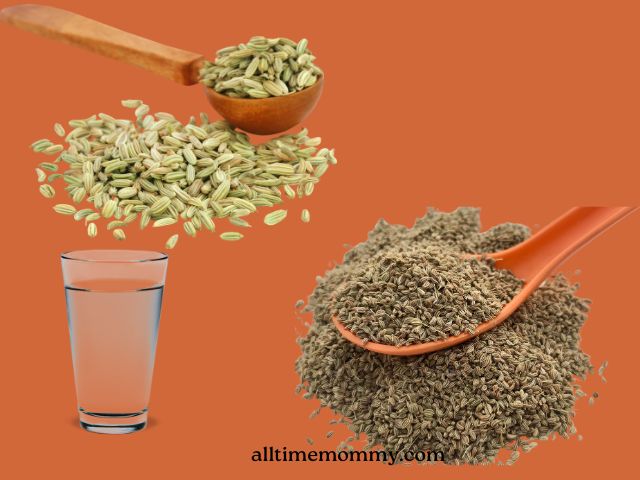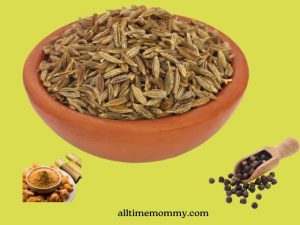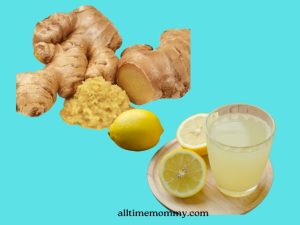This is what relieves bloating fast at home, seeds infused warm water as described in the recipes. Explore a range of quick solutions, including dietary tips, herbal teas, gentle exercises, and over-the-counter options to help beat bloating swiftly and naturally.
Bloating can be an unpleasant experience. It often comes with tightness or pressure in the abdomen, as if your stomach is stretched.
Most of the time, you’ll experience rumbling noises from the stomach or a feeling of being overly full, even if you haven’t eaten much.
It even worsens when you start experiencing inflammation in the small intestine, leading to irritable bowel syndrome (IBS).
A bloated belly is generally uncomfortable and will leave you feeling sluggish and weighed down.
That’s why knowing what relieves bloating fast can help brighten your day and ease these discomforts.
Whether it’s caused by overeating or certain foods in your diet, finding fast relief for bloating is often a top priority.
Luckily, we have a list of effective home remedies to help alleviate bloating quickly and naturally.
But before then,
What Causes Abdominal Bloating and Gas in the Stomach
- Lack of enough stomach acid to kick start digestion process
- Lack of enough bile to breaks down fats
- Lack of enough Enzyme
- Small intestine bacterial overgrowth
- Food intolerance
So,
What Relieves Bloating Fast?
Affiliate Disclosure: As an Amazon Associate, I get a small commission for purchases made from Amazon.com through links in this post. Learn more about our affiliate disclaimer here.
7 Ways To Relieve Bloated Stomach Fast at Home
1. Fennel and Carom Seeds Infused Warm Water
Fennel-carom seed-infused water is a potent natural remedy known for relieving bloating and promoting digestive health.
This infusion combines the benefits of fennel seeds (saunf) and carom seeds (ajwain), both of which have been used traditionally in Ayurvedic and herbal medicine for their digestive properties.
Benefits
Fennel seeds are a traditional remedy often used to alleviate bloating and improve digestion.
Studies suggest that these tiny seeds are rich in fiber. They also contain antibacterial, antifungal, and anti-inflammatory properties that may help reduce bloating and gassiness in the stomach.
In many African and Asian traditions, people chew dried fennel seeds after meals to cleanse their breath and aid digestion. Chewing on ¼ teaspoons of dried fennel seeds helps to release the essential oil that may stimulate the secretion of digestive enzymes in your system for better digestion.
And not just that.
Fennel seed water, often referred to as “saunf water,” is a traditional remedy known for its numerous health benefits, particularly its effectiveness in alleviating bloating and digestive discomfort.
Why?
Because of anethole, fenchone, and estragole, compounds which have anti-inflammatory, antispasmodic, and carminative properties.
Similarly, studies suggest carom seeds contains thymol and carvacrol. These compounds are known to help prevent and treat gas and chronic indigestion.
Here’s how you can make fennel-carom-infused water for bloating.
Ingredients:
- 1 teaspoons of fennel seeds
- 1 tablespoon carom seeds
- 11/2 cup of water
Instructions:
- Pour 1.5 cups of water into your cooking pan and Add the fennel and Carom seeds
- Boil the mixture at low heat for about 10 minutes or until the water is about one cup.
- You will notice that the watercolor changes
- Remove from heat and cover the pot. Let it steep for a few minutes before straining your tea to remove the seeds.
- Drink the infused water warm, preferably after meals.
Tips:
- Dosage: Drinking one cup of warm fennel–carom water after meals can help reduce bloating.
- Freshness: Use fresh or dried fennel-carom seeds for the best flavor and medicinal properties.
- Storage: Store fennel–carom seeds in an airtight container in a cool, dark place to maintain their freshness.
RELATED:
How To Do a Natural Colon Cleanse At Home
2. Consuming Cumin and Black Pepper Seeds Water After Meals
Consuming Cumin and black pepper seed infused water after meals is a traditional remedy known for its digestive benefits. Cumin and black pepper contain compounds that aid digestion, reduce bloating, and promote overall gut health.
Benefits
Taking Cumin water is one of the best remedies known for its digestive benefits, particularly in relieving gas and bloating. According to research, Cumin contains chemical compounds that stimulate the release of digestive enzymes, facilitating the more efficient breakdown of food and reducing the likelihood of gas formation.
Cumin has carminative properties.
It helps expel gas from the intestines, thereby reducing bloating and discomfort. It can also help relax the muscles of the gastrointestinal tract, alleviating cramping and bloating.
Similarly, research shows that consuming black pepper stimulates the release of enzymes in the pancreas. These digestive enzymes may aid the intestines in digesting fat and carbohydrates.
Additionally, you may add jaggery for sweetness.
According to this study, jaggery is a nutritious sweetener that can be blended and fortified with beneficial natural spices. You may use it with medicinal herbs like turmeric, black pepper, fennel, holy basil, giloy, and mint to produce even better antioxidant, detoxifier, and digestive health benefits.
How to Make Cumin and Black pepper Seed Water for Bloating
Ingredients:
- 1 tablespoons of cumin seeds
- 2 black pepper seeds
- 2 cups of water
- 2 tablespoons Jiggery powder
Instructions:
- Put the cumin seeds in a pan to roast on low heat until they turn dark brown.
- Ensure you crush the black pepper seeds in a mortar.
- Pour two cups of water into a cooking pan, add the seeds and jaggery powder, and boil for about 10 minutes on low heat.
- Keep stirring the mixture until you remain with a cup in your cooking pan.
- Reduce the heat and let the seeds simmer in the water for about 5 minutes.
- Turn off the heat and let the tea steep for another 5 minutes.
- Strain the water to remove the seeds.
- Drink the warm water, preferably after meals.
RELATED:
14 Surprisingly Simply Ways To Kick Start a Healthy Lifestyle Without Sweating
3. Ginger –Lemon Tea for Bloating
Ginger-lemon tea is a popular and effective natural remedy for bloating and digestive discomfort. Both Ginger and lemon have powerful properties that aid digestion, reduce gas, and soothe the stomach.
Benefits:
According to a scientific review, Ginger helps to expel gas and reduce bloating, while lemon helps to slow the digestion of sugars and starches.
Studies show that Ginger stimulates the production of digestive enzymes and bile, aiding in the breakdown of food.
It also speeds up the passage of food in your system.
Lemon juice helps kick start the digestive process by increasing stomach acid, which is necessary for digestion.
Combining Ginger and lemon can help boost metabolism and reduce inflammation in the digestive tract, thus reducing bloating and gas.
How to Make Ginger – Lemon Tea For Bloating
Ingredients:
- Medium size fresh ginger root (or 1 teaspoon of ginger powder)
- 1 lemon
- 1 1/2 cups of water
- a spoon of jaggery for sweetening (optional)
Preparation:
-
- Peel and crush the ginger root in a mortar.
- Boil the water in a saucepan.
- Add the Ginger to the boiling water and let it simmer for 10 minutes.
- Turn off the heat and let it cool slightly.
- Squeeze the juice of one lemon into the tea.
- Strain the tea if you wish.
- Drink the tea warm.
Usage Tips:
- Drink ginger-lemon tea before meals for best results.
- Adjust the amount of Ginger and lemon according to your taste and tolerance.
Precautions:
- While Ginger and lemon are generally safe, overconsumption may lead to side effects such as heartburn.
4. Acv for Bloating
Apple cider vinegar (ACV) is a popular natural remedy often used to relieve bloating and improve digestive health. It comes from fermented apples and contains acetic acid, probiotics, and enzymes that contribute to its digestive benefits.
Benefits:
- Aids Digestion: ACV increases the acidity, thus bringing about a desirable pH in the stomach for efficient digestion.
- Boost metabolism: By promoting better digestion and preventing gas buildup, ACV can help alleviate bloating by boosting metabolism.
- Probiotic Benefits: The fermentation process of ACV creates beneficial bacteria that support gut health.
How to Make ACV Water for Bloating
Ingredients:
- 2 tablespoons of organic apple cider vinegar with mother
- 1 cup of warm water
- Lemon juice (optional for flavor)
Method:
-
- Mix ACV in a cup of warm water. (1-2 spoons please)
- You may squeeze in a few drops of lemon water
- Stir well and drink it before meals or when experiencing bloating.
Usage Tips:
- Start with a smaller amount of ACV (1 teaspoon) if you’re new to using it, and gradually increase to 2 tablespoons.
- Drink the mixture 15-30 minutes before meals to help with digestion.
- Use raw, unfiltered ACV with the “mother” for maximum benefits, as it contains beneficial enzymes and probiotics.
Precautions:
- ACV is highly acidic. Drink it diluted and rinse your mouth with water afterward.
- Overconsumption of ACV may lead to stomach upset, throat irritation, or potassium depletion.
- If you have any underlying health conditions, especially those related to the stomach or kidneys, consult your healthcare provider before using ACV.
RELATED:
Healthy Food For Colon: 9 Foods That Rejuvenates Your Colon
5. Abdominal Massage for Bloating
Abdominal massage is a technique used to relieve bloating and improve digestive function. This method involves gently massaging the abdomen to stimulate the digestive organs, promote the movement of gas, and ease discomfort.
Benefits:
- Relieves Bloating: Massage helps to move trapped gas through the intestines, reducing bloating and discomfort.
- Enhances Digestion: Stimulating the abdominal area increases blood flow to the digestive organs, thus improving digestion. It also encourages peristalsis (the wave-like muscle contractions that move food through the digestive tract).
- Alleviates Discomfort: The gentle pressure and movement can reduce abdominal pain and cramping associated with bloating and other digestive issues.
- Promotes Relaxation: The massage can help reduce stress and tension, negatively impacting digestion.
How to Perform an Abdominal Massage for Bloating:
Preparation:
- Find a comfortable, quiet place to lie down.
- You can use a small amount of massage oil, like peppermint essential oil, to reduce friction.
Method:
-
- Lie on your back gently on a soft mat.
- Slightly bend your knees, ensuring your feet remain flat on the floor. This helps to relax your abdominal muscles.
- Place your hands on your lower right abdomen, just above your right hip bone. Use the tips of your fingers to apply gentle pressure. Make small, circular motions around your belly.
- Gradually move your hands upward toward your ribcage, continuing the circular motions.
- Move your hands across your abdomen from right to left, just below your ribcage.
- Continue the circular motions as you move downward to the lower left side of your abdomen, just above your left hip bone.
- Repeat this sequence for 5-10 minutes, moving clockwise and following your colon’s natural path.
Tips for Effective Massage:
- Warm Compress: To help relax the muscles, you can apply a warm compress to your abdomen before the massage.
- Include massage oil that can relieve bloating, like peppermint. Peppermint contains L-menthol. according to studies, this compound can suppress muscle spasms in the stomach and intestines thus, helping treat digestive tract issues.
Precautions:
- Avoid the massage if you experience severe pain.
- If you are pregnant, seek advice from your healthcare provider before trying abdominal massage.
6. Peppermint Tea for Bloating
Peppermint tea is an ancient, well-known natural remedy for bloating and digestive discomfort. Made from the leaves of the peppermint plant (Mentha piperita), this herbal tea has been used for centuries to soothe the digestive system.
The menthol in peppermint soothes the stomach lining and can help alleviate symptoms of indigestion, nausea, and stomach cramps.
Studies indicate that menthol has antibacterial activity against various fungi and harmful bacteria that cause food-borne illnesses.
Additionally, this tea stimulates bile flow, enhancing fat digestion and overall gut wellness.
How to Make Peppermint Tea for Bloating
Ingredients:
-
- 1 tablespoon of fresh peppermint leaves or 1 teaspoon of dried peppermint leaves
- 1 cup of boiling water
- Lemon and pinch of sugar (optional, for taste)
Method:
-
- Place the peppermint leaves in a cup.
- Pour boiling water over the leaves.
- Cover and allow it steep for 5-10 minutes.
- Strain to remove the leaves.
- Add sugar or lemon if desired.
- Drink the tea warm.
7. Take Supplements for Bloating
Supplements are critical to your diet for managing bloating and improving digestive health. Here are some commonly recommended supplements that can help alleviate bloating:
- Probiotics supplement for bloating
Bloating may occur due to an imbalance of gut bacteria. This may lead to an overproduction of gas. Probiotics may help in restoring a healthy balance of gut flora, reducing gas production and bloating.
- Digestive Enzymes
Digestive enzymes break down food into smaller, more easily absorbed molecules. This can help prevent the fermentation of undigested food in the gut, which often leads to gas and bloating.
- Peppermint Oil Capsules
Peppermint oil contains menthol, which has antispasmodic properties. It helps relax the gastrointestinal tract muscles for easier food passage.
- Fiber Supplements
Fibre supplements may add bulk to the stool in the digestive tract, helping it passes more easily through the intestines. This can prevent constipation, a common cause of bloating.
- Betaine hydrochloride supplement
Betaine HCl increase the acidity in the stomach. Adequate stomach acid is essential for the proper breakdown of food, particularly proteins. Low stomach acid can lead to incomplete digestion, causing bloating and discomfort.
- Simethicone supplement
Simethicone is an anti-foaming agent that causes smaller gas bubbles in the tummy and intestines to merge into larger bubbles. These larger bubbles are easier to pass through belching or flatulence, reducing the feeling of bloating and discomfort.
Precautions:
- Always consult with your doctor before starting any new supplement. This is important, especially if you have underlying health conditions or are taking other medications.
- Start with the lowest recommended dose. This will help you see how your body responds and adjust as necessary.
- Be aware of potential side effects, such as increased gas with fiber supplements or gastrointestinal irritation with certain digestive enzymes.
DISCLAIMER The information contained in this post is for general information purposes only. I’m not a health practitioner and as such, this information should not be used as a substitute for consultation with your professional service provider.






